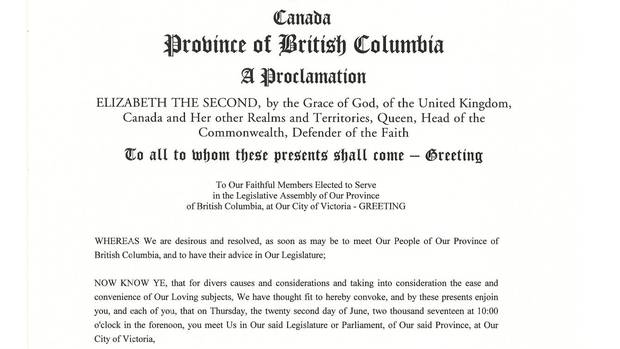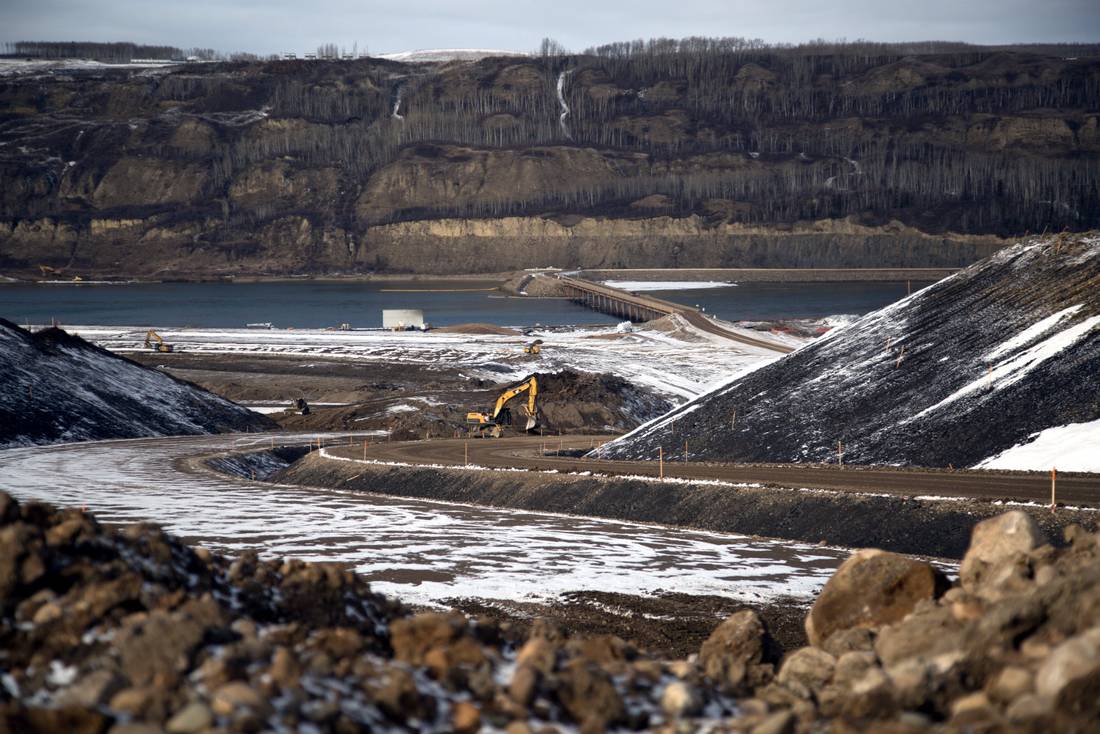British Columbia's Lieutenant-Governor presented the province's latest Throne Speech on Thursday, setting off a process that is expected to end the Liberal government of Premier Christy Clark.
The May 9 election reduced the Liberals to 43 seats in the legislature, one short of a majority. The New Democrats, who won 41 seats, and the Greens, with three, have signed an agreement to use their combined majority to vote down the government at the earliest opportunity. That will likely happen next week.
Explainer: How B.C.'s Liberal government could fall, and what happens next
Gary Mason: BC Liberals' policy reversal is one last grab for power
Here's what you need to know about what's happened so far, and what comes next.
The Throne Speech
The Liberals presented an ambitious Throne Speech that offers a wholesale redesign of the party's re-election platform from the spring.
The speech, read by Lieutenant-Governor Judith Guichon, includes promises related to campaign finance reform, housing, education and transit. And some are eerily similar to promises put forward by the New Democrats – and which the Liberals derided as too expensive and irresponsible.
On the issue of campaign finance reform, the speech includes a promise to ban corporate and union donations to political parties, including preventing corporations, unions or other third-parties from contributing in-kind donations of services rather than cash. The Liberals also want a ban on loans from anyone other than Canadian chartered banks or credit unions.
The speech says the Liberals want a referendum on electoral reform. Proportional representation was a key priority for the Green Party and is also supported by the New Democrats. They also plan to move the province's fixed elections to the fall.
And there are several expensive new programs – made possible, the speech says, by a larger-than-expected surplus, which the government says will be revealed when the province's public accounts are released next month.
Those promises include:
- A $1-billion daycare plan to create 60,000 additional spaces and offer subsidies for families earning less than $100,000 a year – including full subsidies for families making less than $60,000.
- A rent-to-own program that will allow new buyers to access 50,000 units of housing that would be built over 10 years. There would also be new protections for renters to prevent unfair rent increases.
- On public transit, matching the federal government’s contribution for major rapid transit projects in Vancouver and Surrey, and no longer require a referendum before mayors find new ways to raise money to pay for such projects.
- Resume increases to the province’s carbon tax, adding $5 per tonne per year beginning in 2019 to bring it to 50 by 2022.
- Eliminate tolls on two bridges in the Vancouver area – the Port Mann and Golden Ears – and speed up the replacement of the Pattullo Bridge between New Westminster and Surrey.
- A poverty reduction plan – something advocates have been demanding for years. The plan would focus on children, and there would also be basic income support for youth aged 18 to 24 who age out of care.
- A new minister of state for mental health and addiction.
- Accelerated hip and knee procedures, and training for more doctors.
- An additional 500 residential care beds for seniors.
- A new respite tax credit for people caring for people with disabilities.
- A royal commission on education – the first in 30 years – and a review of the funding formula for the province’s public schools districts
The policies have little chance of being implemented any time soon, at least not by a Liberal government, and critics have dismissed the effort as a cynical death-bed conversion. But the Liberals insist they learned the lessons of their disappointing election result and are simply responding to what voters told them.
Speaking to reporters following the Throne Speech, the premier said voters expect political parties to work together, share ideas and adapt.
"This Throne Speech is a sincere response to what we've heard, and so we want to gain the confidence of the legislature," said Ms. Clark.
"We ran an election, and we got the most seats and the most votes. But it was a very mixed result, and the responsibility of a government is to listen to those results
."
Ms. Clark said her party would campaign on the ideas included in the Throne Speech in the next election.

A portion of the official proclamation recalling the B.C. legislature for June 22, 2017.
BC Legislature
The Speaker
Liberal MLA Steve Thomson was acclaimed Speaker after formally resigning his post as forests minister.
The role of the legislature's Speaker has received considerable attention given the standings in the legislature. Because the Speaker only votes in the event of a tie, an NDP or Green Speaker would have been be called upon to cast the deciding vote on the imminent confidence vote attached to the Throne Speech. That would have been a particular problem because Speakers, by convention, are expected to vote with the government on confidence motions to prevent it from falling.
The legislature's clerk, Craig James, acknowledged the speculation before announcing Mr. Thomson's acclamation : "Much has been said about the speakership in the Legislative Assembly of British Columbia since May 9. A lot of what is being talked about is wrong. A lot of what has been examined by way of confidence motions, casting vote and the way this place functions is and has been wrong.
"
But Mr. Thomson may not be in the role for long. The Liberals have suggested none of their members want to serve as Speaker under an NDP government, suggesting the new Speaker will likely resign. That would force the New Democrats or Greens to put forward someone, who would be expected to routinely break ties in the legislature – typically a rare occurrence.
In a news conference after he was named Speaker, Mr. Thomson suggested he does not intend to stay on. "If the government changes, it's the government that identifies a Speaker," said Mr. Thomson. "Again, I'm not going to speculate as to how things will unfold. My job will be to manage the house in the legislature to the best of my ability."
NDP Leader John Horgan referenced the uncertainty in a speech to the legislature following Mr. Thomson's election, thanking him for serving in the "days and weeks and months and years ahead." That prompted laughter and applause from the other MLAs.
B.C. NDP leader John Horgan and B.C. Green Party Leader Andrew Weaver hold a signed document in which they agree to take down the Liberal government and support an NDP minority government.
Chad Hipolito/THE CANADIAN PRESS
The confidence vote
The schedule for what happens next is mapped out in the legislature's standing orders, which require a minimum of four days of debate on the Throne Speech. On the fourth day – next Thursday – the New Democrats are expected to propose an amendment declaring the legislature has lost confidence in the house. The New Democrats want a confidence vote on Monday, but the Liberals would need to agree for that to happen.
Whenever the vote does happen, the New Democrats and Greens are expected to defeat the Liberals with a vote of 44-42, and the government would fall.
Premier Christy Clark would then visit the Lieutenant-Governor to inform her that the government had lost the confidence of the house. Experts have suggested the Lieutenant-Governor is likely to ask Mr. Horgan to form government, especially since the New Democrats have a power-sharing agreement in place with the Greens, clearing the way for Mr. Horgan to become premier.
Ms. Clark has already said she does not intend to ask for a new election, though that decision is ultimately up to the Lieutenant-Governor.
